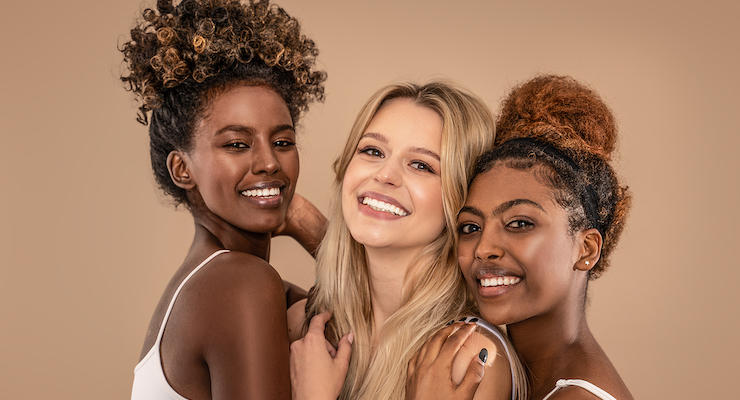12.07.21
A survey of 1,285 consumers in the U.S. and the U.K. conducted by ingredient supplier Lycored found that individuals’ beauty and personal care needs tended to vary according to their skin tone, the company reports.
Consumers with the darkest skin tones, for example, were most likely to select healthy glow/radiance as a goal they wanted to achieve. This was a goal for 67% of Americans with dark brown or black skin, compared to 51% of those with pale or fair skin.
Meanwhile, people with the lightest skin tones were the most likely to seek protection from UV light. In the U.K., this was a goal for 34% of respondents with pale or fair skin, compared to 17% of those with dark brown or black skin tones.
Consumers mostly purchased products designed for their particular skin tones, Lycored said. This was true for 73% of consumers who defined their skin as dark brown or black, and true for 54% of those with white skin.
However, the research also found that consumers largely view products which don’t target particular tones or colors, such as ingestible products, as widely appealing. 73% of Americans surveyed, for example, agreed with the statement “products that provide the same benefits for people of all skin tones offer a platform for inclusivity.”
These consumer findings bode well for a recent campaign launched by Lycored, called #Rethinkbeautiful, which calls for more inclusivity and positivity in the skincare industry.
“When we launched #rethinkbeautiful we had no idea just how much it would resonate. Embracing diversity is no longer optional and brands are working much harder to meet the needs of all their customers. Our research shows that ingestible beauty products can offer a powerful possible platform for true inclusivity, adding to the ways the industry can strive to meet the beauty needs of everyone.”
The State of Inclusivity
According to the respondents, the beauty industry still has a way to go when it comes to catering to the full range of its consumers’ needs. In the U.K., 74% of respondents with dark brown or black skin believed it was harder for people with darker skin tones to find the right products, while only 26% of those with white skin thought the same about products catering to their skin tones.
Despite this, the respondents shared a widespread perception that manufacturers are becoming more inclusive. 62% of U.S. consumers believed that the beauty industry has become better than it was before at meeting the needs of people of all skin tones, Lycored reports.
Consumers with the darkest skin tones, for example, were most likely to select healthy glow/radiance as a goal they wanted to achieve. This was a goal for 67% of Americans with dark brown or black skin, compared to 51% of those with pale or fair skin.
Meanwhile, people with the lightest skin tones were the most likely to seek protection from UV light. In the U.K., this was a goal for 34% of respondents with pale or fair skin, compared to 17% of those with dark brown or black skin tones.
Consumers mostly purchased products designed for their particular skin tones, Lycored said. This was true for 73% of consumers who defined their skin as dark brown or black, and true for 54% of those with white skin.
However, the research also found that consumers largely view products which don’t target particular tones or colors, such as ingestible products, as widely appealing. 73% of Americans surveyed, for example, agreed with the statement “products that provide the same benefits for people of all skin tones offer a platform for inclusivity.”
These consumer findings bode well for a recent campaign launched by Lycored, called #Rethinkbeautiful, which calls for more inclusivity and positivity in the skincare industry.
“When we launched #rethinkbeautiful we had no idea just how much it would resonate. Embracing diversity is no longer optional and brands are working much harder to meet the needs of all their customers. Our research shows that ingestible beauty products can offer a powerful possible platform for true inclusivity, adding to the ways the industry can strive to meet the beauty needs of everyone.”
The State of Inclusivity
According to the respondents, the beauty industry still has a way to go when it comes to catering to the full range of its consumers’ needs. In the U.K., 74% of respondents with dark brown or black skin believed it was harder for people with darker skin tones to find the right products, while only 26% of those with white skin thought the same about products catering to their skin tones.
Despite this, the respondents shared a widespread perception that manufacturers are becoming more inclusive. 62% of U.S. consumers believed that the beauty industry has become better than it was before at meeting the needs of people of all skin tones, Lycored reports.




























